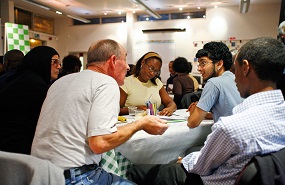Blog

Guest Blog: The Innovation Challenge- University of East London commit to tackling London’s health inequality
08 Dec 2014
 London is a leading world city but it also has some of the starkest inequalities in health and deprivation in the UK. Well London provides a framework for integrating work with disadvantaged communities at neighbourhood level to build community capacity and improve health and well-being.
London is a leading world city but it also has some of the starkest inequalities in health and deprivation in the UK. Well London provides a framework for integrating work with disadvantaged communities at neighbourhood level to build community capacity and improve health and well-being.
With Big Lottery funding, phase 1 Well London ran from 2007 to 2011 in 20 disadvantaged areas across 20 London boroughs. The framework is now in a 2nd phase of development in 11 neighbourhoods across 9 London boroughs, including, for example, in Brent, Tower Hamlets, Lewisham and Greenwich, and also including a primary care based programme in Newham.
Researchers from UEL’s Institute for Health and Human Development (IHHD), have led on the design, research and development of the Well London framework from the outset and have also directly delivered project activities which stimulate and facilitate community engagement in the initial neighbourhood level needs assessment and local programme design.
The UEL led engagement project is part of the core Well London activities, termed ‘heart of the community’, which engage and skill up local people to lead and manage local activities through ‘Training Communities’ projects and to develop and support peer-to-peer approaches through the Well London volunteer Delivery Teams and Youth.com projects. Action on community needs and issues is also taken forward through a portfolio of ‘themed’ activities and projects. These vary according to the needs and issues identified by each community and can include, for example, action to improve healthy eating, physical activity, mental well-being, local environments, local communications, creativity and community cohesion.
Partnership working is a key feature of Well London, which is currently being developed, commissioned and implemented by a unique alliance of national, regional and local organisations. National and regional organisations include, for example, the Royal Society of Public Health, Greater London Authority and South London and Maudsley NHS Foundations Trust. At the local level the alliance includes Local Authorities, Housing Associations, local GP Practices, a wide range of local voluntary sector organisations and community groups and members.
UEL is determined to develop Well London as an evidence based framework and benchmark for community development approaches to health improvement. To this end, UEL researchers secured additional funding from the Welcome Trust, a global foundation which supports health research, to evaluate Well London.
The programme was officially recognised for its achievements and innovative approach to promoting community health, by receiving the Health Promotion and Community Well-being award from the Royal Society of Public Health in 2011.
Well London’s innovative approach has been recognised by the National Institute for Health and Care Excellence (NICE) and was cited in Parliament as a good example of how effective community engagement can impact health and wellbeing.
Gail Findlay, Director of Health Improvement, Institute of Health and Human Development, University of East London.
Follow University of East London on Twitter at @UEL_news